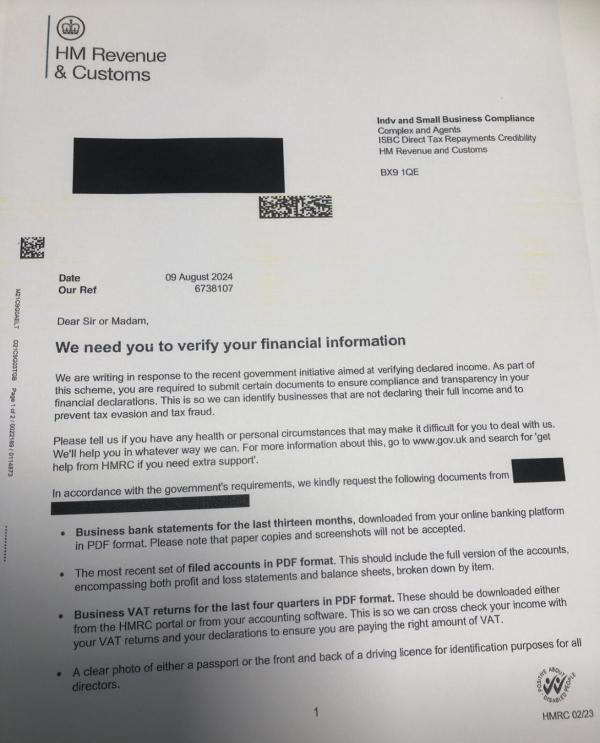
How confident are you that correspondence you receive from HMRC or other Government departments is real?
In recent weeks, the ATT has become aware of a batch of letters claiming to come from HMRC and asking for personal and financial details. The letters are in fact fraudulent, designed to encourage taxpayers to share valuable information with the scammers.
The accountancy firm Azets spotted the scam after one of their clients received a letter purporting to come from HMRC. They shared this letter (images below) as a warning to others, and our colleagues at the Low Incomes Tax Reform Group have also raised it with HMRC. HMRC subsequently confirmed that they did not issue the letter and that it is fraudulent.
This letter is particularly concerning because it very effectively mirrors the style, layout and tone of HMRC letters. The key giveaway is that the email address supplied in the letter ends in a fake domain, ‘hmrc-taxchecks.org’ which does not belong to HMRC. Genuine HMRC emails should end in ‘hmrc.gov.uk’.
Since the scam has been flagged on social media, we understand that the scammers have continued to send similar letters but including different email addresses for reply purposes. Employers should be alert for letters like this and warn employees not to respond to letters purporting to be from HMRC without first checking any email addresses or contact details supplied very carefully.
If you are unsure, you can check a list of genuine HMRC contacts online and also report suspicious HMRC emails, texts or phones calls to HMRC.
To help, the ATT also has a short video on how to spot HMRC scams.
Companies House
It’s not just HMRC, other Government departments are also subject to impersonation by scammers. Fraudsters also pretend to be Companies House in order to solicit company details or payments.
A full list of recent scams across email, phone and letter can be found on reporting scams pretending to be from Companies House.
Fraud figures
It’s important to take fraud seriously because, even if you have not yet been targeted, there is a very high risk of experiencing fraud.
According to figures from the Crime Survey for England and Wales, in the year ending September 2023 a shocking 1 in 17 people were victims of fraud in just that one year. For businesses, the Economic Crime Survey 2020 results suggested that 1 in 5 businesses were a victim of fraud over a three-year period.
Government Campaign
In February, the Government launched a new campaign – Stop! Think Fraud to help people stay ahead of scams and protect themselves from criminals. The campaign, led by the Home Office, has been developed in partnership with many organisations across Government, law enforcement and industry. The website contains details of how to spot fraud, what to do to protect yourself and how to recover from fraud, if the worst happens.
Images of example fraudulent letter


This article reflects the position at the date of publication shown above. If you are reading this at a later date you are advised to check that that position has not changed in the time since.
We regularly publish articles on a range of tax and wider topical issues which affect employers. If you wish to subscribe to our monthly Employer Focus e-newsletter, please contact us.














